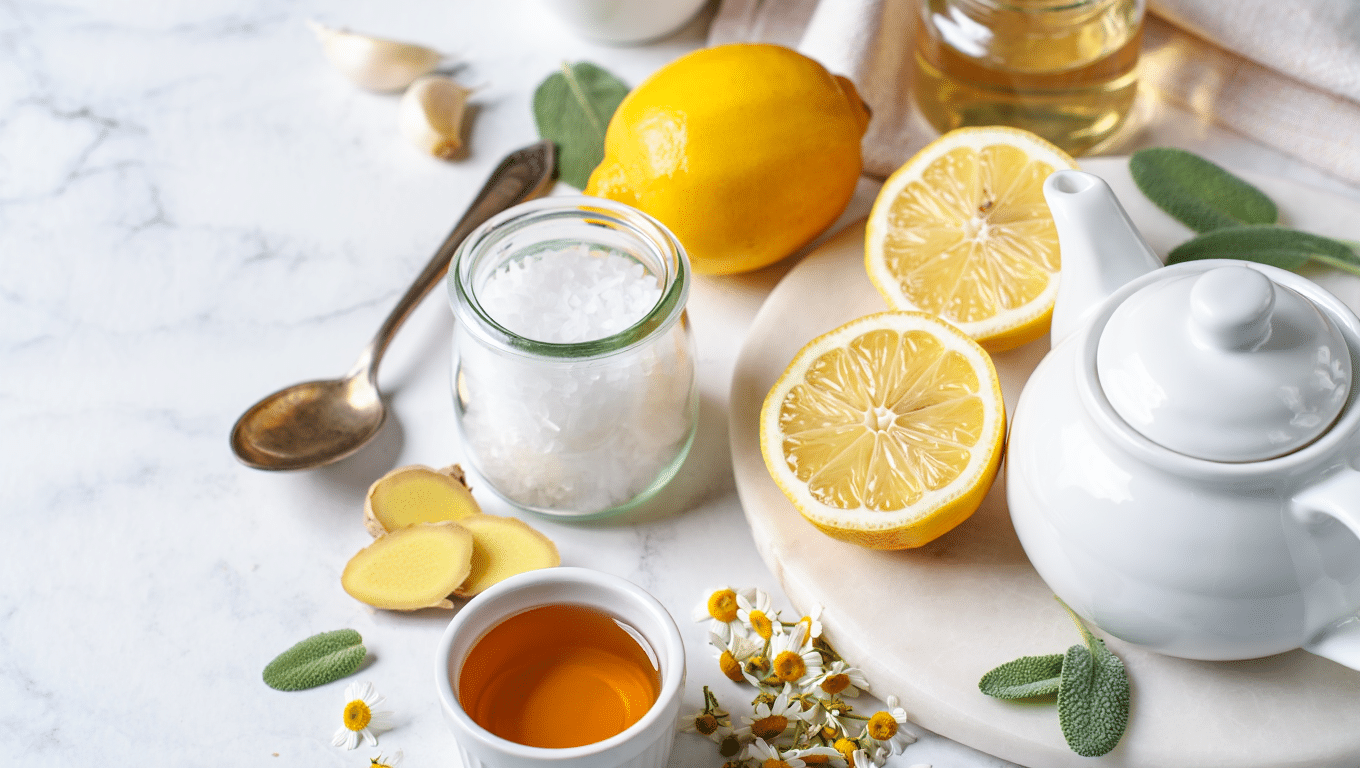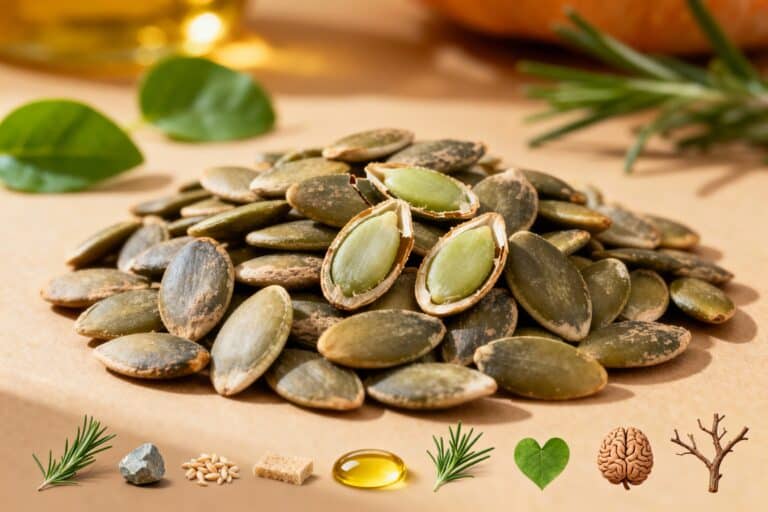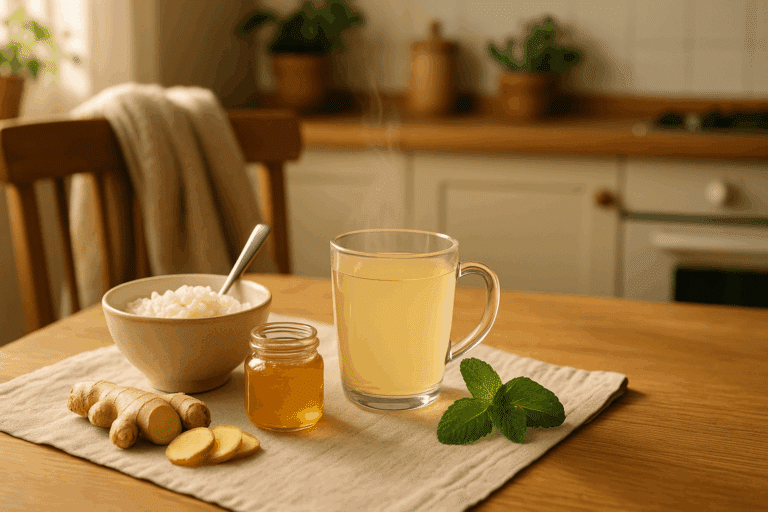6 Gentle Home Remedies to Help You Recover From Strep Throat

If you’re dealing with the discomfort of strep throat, you might be searching for relief. Fortunately, several gentle home remedies can ease your symptoms and support your recovery. From soothing gargles to hydrating drinks, these methods can make a difference. But which remedies are most effective and how do they work? Let’s explore the options that can help you feel better sooner.
Gargling Solutions
Gargling solutions can provide significant relief from strep throat symptoms. Mixing ½ teaspoon of salt in warm water creates an effective gargle that flushes bacteria and loosens mucus. Alternatively, use 1 tablespoon of apple cider vinegar in warm water for its antimicrobial properties. Adding honey or lemon can enhance the taste and soothe your throat. For another option, try two drops of thyme oil in water, known for its antibacterial effects against strep strains.
To maximize benefits, gargle several times a day, swishing the solution around your mouth and throat, but avoid swallowing. Remember to steer clear of acidic additives that might irritate your throat further. These simple solutions can help ease discomfort and promote natural healing during your recovery process. It is important to note that strep throat is a bacterial infection that requires antibiotic treatment for complete recovery.
Soothing Throat Coatings
When dealing with the discomfort of strep throat, certain soothing coatings can provide much-needed relief. Honey is a top choice; you can mix it into warm tea or take it straight to coat your throat and ease irritation. It also has natural antibacterial properties. Keeping the throat moist with warm salt water can further alleviate pain and discomfort. Oils such as olive oil can also help maintain overall throat health when consumed regularly.
Ginger is another option; try sipping ginger tea or chewing on ginger slices to soothe your throat. Untreated strep throat can lead to complications, so it’s essential to address symptoms promptly. Apple cider vinegar can help, but use it with caution and dilute it before trying. Soft foods like yogurt or applesauce can also coat your throat and make swallowing easier. Finally, make sure to avoid irritants like smoke, as they can aggravate your throat further and hinder your recovery.
Hydration and Bland Diet
Staying hydrated is vital when you’re dealing with strep throat, as it helps keep your throat moist and soothe irritation. Pairing that with a bland diet of soft foods can make swallowing less painful and provide essential nutrients. Together, these strategies can greatly ease your discomfort and support your recovery. Additionally, you can receive personalized care plans from healthcare providers to ensure you are following the best practices for your recovery. Drinking cold fluids can temporarily numb a sore throat, adding another layer of relief to your hydration efforts.
Importance of Hydration
Hydration plays an essential role in your recovery from strep throat. Staying well-hydrated not only keeps your throat moist, but it also helps maintain your energy levels.
Here are some key benefits of proper hydration during your recovery:
- Prevents dehydration: Drinking fluids keeps your throat comfortable and supports energy.
- Soothes inflammation: Water and herbal teas reduce irritation and promote healing.
- Maintains electrolyte balance: Essential minerals like sodium and potassium keep your body functioning well.
- Supports immune function: Proper hydration aids in toxin removal and keeps your mucous membranes healthy, which is vital for supporting the immune system. Additionally, viral infections can lead to increased fluid loss, making hydration even more crucial during your recovery.
Benefits of Soft Foods
Soft foods can greatly ease your recovery from strep throat by providing comfort and crucial nutrients. Their smooth texture minimizes irritation when you swallow, helping you avoid further pain. You’ll find that moist foods require less chewing, making eating less uncomfortable. Focus on nourishing options like yogurt, oatmeal, and mashed potatoes, which supply essential proteins, vitamins, and minerals.
Smoothies filled with berries can combat inflammation, while soups hydrate and replenish electrolytes, as hot fluids enhance nasal mucus movement. Consuming natural remedies can support your immune system during recovery. Avoid crunchy or spicy foods that could exacerbate soreness. Incorporating soothing foods like Jell-O or ice cream can temporarily numb your throat, offering relief. By choosing soft foods, you not only support your recovery but also guarantee you’re getting the nutrition your body needs. Additionally, staying hydrated is crucial when sick, as it helps reduce throat irritation.
Herbal and Natural Antimicrobials
When you’re looking to boost your immune system during a strep throat infection, herbal options like echinacea can be quite helpful. Elderberry also offers impressive benefits, potentially reducing the severity of symptoms. Exploring these natural antimicrobials might just provide the relief you need. It’s important to remember that antibiotics are recommended as the primary treatment for strep throat to prevent serious complications. Seeking a medical evaluation is essential to determine the cause of your throat discomfort and ensure appropriate diagnosis and treatment. Furthermore, vitamin C is known to strengthen the immune system during illness, making it a valuable addition to your recovery plan.
Echinacea for Immune Support
Echinacea is well-known for its ability to support the immune system, especially during infections like strep throat. This powerful herb can enhance your body’s natural defenses through immune modulation and anti-inflammatory properties.
Here are some benefits of incorporating echinacea into your recovery routine:
- Stimulates T-cell proliferation and enhances NK cell activity for better pathogen clearance.
- Reduces throat swelling and discomfort with its anti-inflammatory phytochemicals.
- Inhibits bacterial adhesion, targeting pathogens like group A Streptococcus effectively.
- Available in various forms such as teas and tinctures for rapid absorption. Echinacea is believed to have immune system benefits, making it a popular choice during illness recovery. Furthermore, it may reduce the severity of upper respiratory symptoms, further aiding your recovery. Moreover, combining echinacea with ginger’s antimicrobial properties can provide a synergistic effect in fighting infections and enhancing overall immune function.
Benefits of Elderberry
Elderberry is a potent herbal remedy that offers impressive antimicrobial benefits, making it a valuable ally in the fight against strep throat and other infections. It effectively targets *Streptococcus pyogenes* and other harmful bacteria, inhibiting their growth with liquid extracts. This herb also shows antiviral properties, helping to reduce the severity of respiratory symptoms and potentially preventing secondary bacterial infections during viral illnesses. Elderberry soothes throat irritation and inflammation, providing relief through its mucosal protective actions. Plus, its vitamin C and zinc content boosts your immune response, enhancing your body’s ability to combat pathogens.
Elderberry products are packed with Vitamin C and Zinc, which further supports the immune system in fighting off infections. It is important to note that strep throat is caused by bacteria, so while elderberry can be helpful, antibiotics are necessary for effective treatment. Just remember to consult a healthcare professional before using elderberry, especially for children or those under medical treatment, and avoid raw forms of the plant.
Rest and Fluid Management
Rest and fluid management play crucial roles in recovering from strep throat, as adequate rest supports your immune system while proper hydration keeps your throat lubricated. Prioritizing rest allows your body to focus on healing, so listen to your body and take it easy. Staying hydrated is equally important; it soothes your throat and helps flush out toxins. Remember that antibiotics can kill bacteria and expedite recovery, making hydration even more critical during treatment. It is essential to keep in mind that strep throat is highly contagious, so maintaining good hydration practices is not only beneficial for your recovery but also helps prevent spreading the infection to others.
Rest and hydration are vital for strep throat recovery, as they boost immunity and soothe the throat.
Consider the following tips:
- Drink plenty of water throughout the day.
- Enjoy warm liquids like herbal teas or broth.
- Opt for soothing options such as popsicles or ice chips.
- Use a humidifier to maintain moisture in the air.
Additional Supportive Measures
While rest and hydration are essential for recovery, incorporating additional supportive measures can greatly ease your symptoms and promote healing from strep throat.
Consider these helpful strategies:
Topical and Mouthcare Measures
- Apply warm compresses to your neck.
- Gargle with saline solution.
- Use herbal mouth rinses like thyme oil.
Dietary Modifications
- Eat soft foods like yogurt and mashed potatoes.
- Avoid irritants, such as spicy or acidic foods.
Symptom Alleviation
- Take OTC pain reducers.
- Suck on lozenges or ice chips.
- Use a cool mist humidifier.
Environmental Adjustments
- Steer clear of smoke and pollutants.
- Regularly clean your humidifier.
Care Considerations
- Monitor your symptoms.
- Consult a doctor if symptoms persist.
Frequently Asked Questions
Can Strep Throat Be Contagious After Starting Treatment?
Yes, strep throat can still be contagious shortly after starting treatment. You’re not contagious 24-48 hours after beginning antibiotics, but it’s essential to complete your course to prevent complications and further spread.
What Foods Should I Avoid During Recovery?
During recovery, you should avoid dry, crunchy foods like chips and crackers, acidic fruits and juices such as oranges and tomatoes, spicy items, alcohol, and very hot foods to prevent further throat irritation.
How Long Does Strep Throat Typically Last?
Strep throat typically lasts about 2 weeks without treatment, but with antibiotics, you’ll usually start feeling better in 1–2 days. Completing your antibiotic course is essential for full recovery and preventing complications.
When Should I See a Doctor for Strep Throat?
You should see a doctor for strep throat if you experience difficulty breathing, persistent high fever, worsening symptoms after two days, or any unusual signs like a rash. Early treatment can prevent complications.
Are Over-The-Counter Medications Effective for Strep Throat Symptoms?
Yes, over-the-counter medications can effectively relieve strep throat symptoms like fever and pain. They provide temporary relief but won’t cure the infection. Always combine them with prescribed antibiotics for the best recovery outcome.
Conclusion
By incorporating these gentle home remedies, you can ease your recovery from strep throat. Gargling salt water, sipping soothing teas with honey, and staying hydrated can make a world of difference. Don’t forget to enjoy soft foods and consider natural antimicrobials like elderberry. Resting and managing your environment will help you heal faster. Remember to listen to your body and give it the care it needs to get back on track. You’ll be feeling better in no time!
References
- https://alldaymedicalcare.com/10-home-remedies-for-strep-throat-symptoms/
- https://www.singlecare.com/blog/home-remedies-for-strep-throat/
- https://sleighfamilychiropractic.com/blog/16-home-remedies-for-strep-throat/
- https://fliphtml5.com/txuuu/khqk/Hans_Kimmel_202122/
- https://www.aentassociates.com/the-best-natural-strep-throat-remedies/
- https://www.healthline.com/health/salt-water-gargle
- https://www.mountsinai.org/health-library/diseases-conditions/strep-throat
- https://www.mayoclinic.org/diseases-conditions/strep-throat/diagnosis-treatment/drc-20350344
- https://www.gohealthuc.com/library/strep-throat-home-remedies
- https://my.clevelandclinic.org/health/diseases/4602-strep-throat






